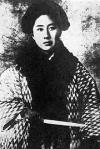Qiu Jin poet from China was born on October 8, 1875, had 31 years and died on July 15, 1907. Poems were written mainly in Chinese language. Dominant movement is chinese dynasties.
Biography
Qiu Jin was a Chinese revolutionary, feminist and writer. She was executed after a failed uprising against the Qing Dynasty. She is considered a national heroine in China.
Born in Xiamen, Fujian, Qiu grew up in her ancestral home, Shanyin Village, Shaoxing, Zhejiang. Married, Qiu found herself in contact with new ideas. In 1904 she decided to travel overseas and study in Japan, leaving her two children behind. She was fond of martial arts, and known by her acquaintances for wearing Western male dress and for her left-wing ideology. She joined the Triads, who at the time advocated the overthrow of the Qing Dynasty and restoration of Han Chinese governance. She joined the anti-Qing societies Guangfuhui, led by Cai Yuanpei, and the Tokyo-based Tongmenghui led by Sun Yat-sen. She returned to China in 1905.
After returning to China, Qiu started publishing a women's magazine in which she encouraged women to gain financial independence through education and training in various professions. She encouraged women to resist oppression by their families and by the government. At the time it was still customary for women in China to have their feet bound at the age of five. The result of this practice was that the feet were small but crippled. Women's freedom of movement was severely restricted and left them dependent on other people. Such helpless women were, however, more desired as wives, so their families continued the practice to protect their daughters' future security.
Qiu felt that a better future for women lay under a Western-type government instead of the Qing government that was in power at the time. She joined forces with her cousin Xu Xilin and together they worked to unite many secret revolutionary societies to work together for the overthrow of the Qing Dynasty.
She was an eloquent orator who spoke out for women's rights, such as the freedom to marry, freedom of education, and abolishment of the practice of foot binding. In 1906 she founded a radical women's journal with another female poet, Xu Zihua, in Shanghai. In 1907 she became head of the Datong school in Shaoxing, ostensibly a school for sport teachers, but really intended for the military training of revolutionaries.
On July 6, 1907 Xu Xilin was caught by the authorities before a scheduled uprising in Anqing. He confessed his involvement under interrogation and was executed. Immediately after, on July 12, the authorities arrested Qiu at the school for girls where she was a principal. She was tortured but refused to admit her involvement in the plot, but they found incriminating documents and a few days later she was publicly beheaded in her home village, Shanyin, at the age of 31. Qiu was acknowledged immediately by the revolutionaries as a heroine and martyr, and she became a symbol of women's independence in China.
Qiu was immortalised in the Republic of China's popular consciousness and literature after her death. She is now buried beside West Lake in Hangzhou. The People's Republic of China established a museum for her in Shaoxing, named Qiu Jin's Former Residence (绍兴秋瑾故居).
Her life has been portrayed in two films, one simply entitled Qiu Jin released in 1983 and a second in 2011 named Jing Xiong Nüxia Qiu Jin (竞雄女侠秋瑾).






